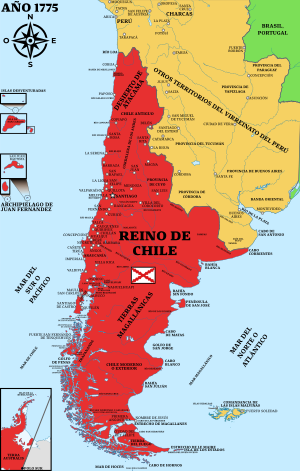José de Garro facts for kids
Marcos José de Garro Senei de Artola (1623–1702) was a Spanish military leader and governor. People called him "El Santo" (The Saint) because he was very religious. He worked in many important jobs for the Spanish Empire in different parts of the world.
Garro was a governor in South America, leading the provinces of Tucumán (from 1675–1678), Buenos Aires (from 1678–1682), and Chile (from 1682-1692). Back in Spain, he was in charge of the military at Gibraltar and later became the Captain General of the Basque Country until he died in 1702. He is most famous for successfully attacking the Portuguese settlement at Colonia del Sacramento, which was the first time the Spanish captured that town.
Contents
Early Military Life
Garro was born in Mondragón, a town in Guipúzcoa, Spain. When he was young, he joined the Spanish Army. He fought in battles in Catalonia and Portugal, eventually becoming a colonel.
His career in Spain changed when he had a disagreement with a very powerful general. Because of this, Garro decided it would be better to live far away from the Spanish court. He asked for a job in the Indies (the Americas) and was given the role of governor for the province of Tucumán.
Serving in Argentina
For four years, from 1675 to 1678, Garro was the governor of the distant province of Tucumán. This area was part of the large Viceroyalty of Peru. During his time there, he led three military trips into the Chaco region. These trips helped establish Fort El Pongo to the east of Jujuy, which protected the city. After this, Garro was promoted to become the governor of Buenos Aires, which was part of the Viceroyalty of the Río de la Plata.
Taking Colonia del Sacramento
In 1680, Garro led an important mission to remove the Portuguese from Colonia del Sacramento. This settlement had been built recently (1679-1680) in what is now Uruguay by Manuel de Lobo, the Portuguese governor of Río de Janeiro.
Garro surprised the Portuguese soldiers with his own army, which included 3,000 Guaraní people from the Jesuit Reductions. The Spanish army captured the city after a battle. About 100 Portuguese soldiers were killed, and the Spanish took many enemy troops and residents prisoner, including Governor Lobo himself.
However, the king of Spain did not approve of Garro's attack because it was done without his permission. So, the settlement was given back to Portugal the next year, in 1681. This was part of a temporary agreement that led to more talks and eventually the Treaty of Utrecht in 1713.
Governor of Chile
Garro served as the Royal Governor of Chile from 1682 to 1692. He wanted to lead big military campaigns against the Mapuche people, but the King of Spain did not approve his plans.
Garro had an idea to make peace in Araucanía without much fighting. He suggested inviting the Mapuche chiefs and elders to a meeting, where they would then be captured. However, in 1686, King Charles II of Spain rejected this plan, saying it was dishonest.
Garro was also known for his strong moral leadership. This is why he was called "El Santo" (The Saint). He even sent away two judges, Sancho Garcia Salazar and Juan de la Cueva y Lugo, because of their bad behavior. Instead of fighting the Mapuche, Garro spent most of his time dealing with attacks from privateers, who were like legal pirates, raiding the coast more and more often.
Fighting Privateers
To stop pirates from getting supplies, Garro ordered everyone to leave Isla Mocha. This island was a place where pirates often stopped. Famous privateers in the area at this time included Englishmen Edward Davis and Charles Swan in 1684, William Knight in 1686, and Jean Strong in 1690.
When the people were moved from Isla Mocha, a person named Jerónimo de Quiroga wrote that the local native people "went in baskets of bulrush a distance of 12 leagues all without losing a thing."
At the same time, Garro ordered the building of the Castillo (Castle) San José de Valparaíso. This was the first fort in that important port town. He also organized special prayers and religious events to ask for protection from the dangers.
Return to Spain
Garro's actions in the Americas were well-received by the Spanish court. He was given command of Gibraltar. While there in 1691, he was fined a small amount of money (4,000 maravedíes) for not ordering the planting of new trees on the nearby hills. Later, he became the Captain General (military governor) of the Basque Country.
Garro died in San Sebastián, Guipúzcoa, in 1702.
See also
 In Spanish: José de Garro para niños
In Spanish: José de Garro para niños
 | Bayard Rustin |
 | Jeannette Carter |
 | Jeremiah A. Brown |


